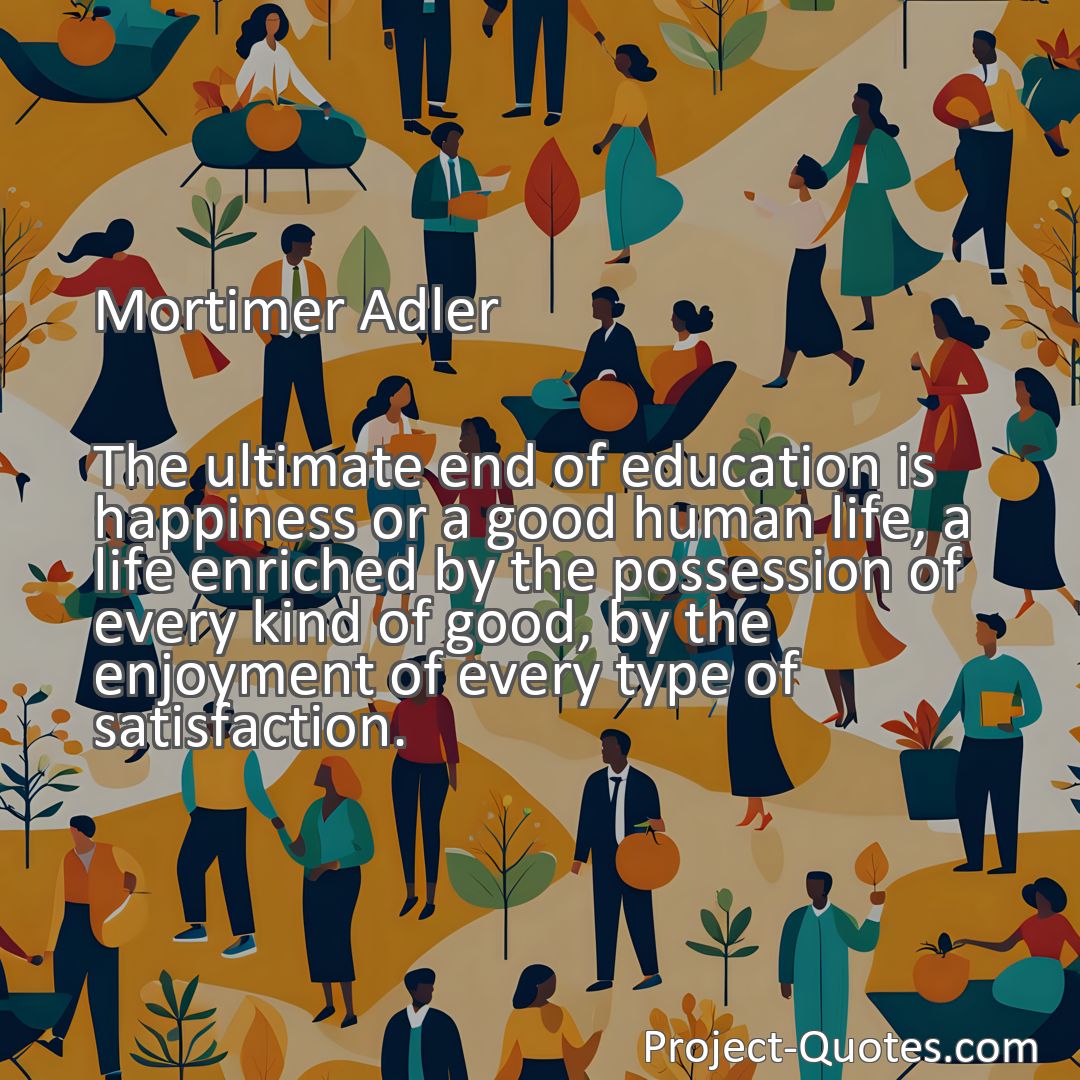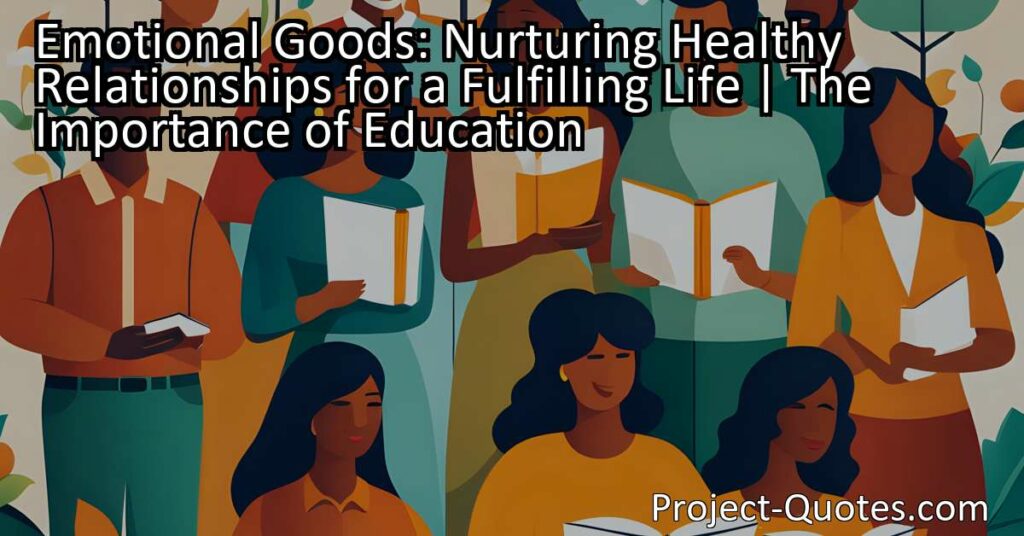The ultimate end of education is happiness or a good human life, a life enriched by the possession of every kind of good, by the enjoyment of every type of satisfaction.
Mortimer Adler
Emotional Goods: Nurturing Healthy Relationships for a Fulfilling Life Education is not just about gaining knowledge and skills, but also about nurturing healthy relationships. By prioritizing emotional goods, such as cultivating emotional intelligence and practicing self-care, education helps us build meaningful connections and contribute to our overall happiness and well-being.
Table of Contents
- 1 The ultimate end of education is happiness or a good human life, a life enriched by the possession of every kind of good, by the enjoyment of every type of satisfaction.
- 2 Mortimer Adler
- 3 Meaning of Quote – The ultimate end of education is happiness or a good human life, a life enriched by the possession of every kind of good, by the enjoyment of every type of satisfaction.
- 4 Freely Shareable Quote Image
- 5 Related
Meaning of Quote – The ultimate end of education is happiness or a good human life, a life enriched by the possession of every kind of good, by the enjoyment of every type of satisfaction.
In the pursuit of education, Mortimer Adler argues that the ultimate objective is not merely to acquire knowledge or gain skills but to attain happiness and live a fulfilling life. According to him, education should encompass the enrichment of one’s existence by embracing all forms of goodness and experiencing diverse sources of satisfaction.
Education serves as a guiding force that leads individuals on the path towards a good human life. It provides us with the tools necessary to navigate through the complexities of the world and make informed decisions. However, the true significance of education lies beyond the classroom walls. Its purpose extends far beyond just filling our minds with facts and figures; it is about gaining the wisdom to flourish as individuals and contribute meaningfully to society.
When we think of a good human life, happiness is often the first thing that comes to mind. But Adler suggests that true happiness is not merely momentary pleasure or fleeting joy. It is a deeper, more profound state of being that stems from the possession of every kind of good. By prioritizing education, we equip ourselves with the necessary skills, knowledge, and virtues to uphold and appreciate the manifold aspects of life that contribute to our overall wellbeing.
The possession of every kind of good does not solely refer to material wealth or possessions. Rather, it encompasses a broad spectrum of elements that contribute to our personal growth and fulfillment. These goods can be intellectual, moral, emotional, and spiritual in nature, all of which require a well-rounded education to fully grasp and appreciate.
Intellectual goods involve engaging in lifelong learning, pursuing knowledge, and developing critical thinking skills. When we acquire knowledge, we expand our understanding of the world and become open to different perspectives, enabling us to make informed decisions and contribute to the betterment of society. Education assists us in developing these intellectual goods, allowing us to become more well-rounded individuals.
Moral goods relate to the development of virtues and principles that guide our actions and interactions with others. Education plays a vital role in shaping our moral compass, teaching us the importance of empathy, kindness, honesty, and justice. By emphasizing moral education, we develop the ability to distinguish between right and wrong, fostering a sense of responsibility towards ourselves and others.
Emotional goods involve nurturing healthy relationships, cultivating emotional intelligence, and practicing self-care. Education aids us in understanding our emotions, respecting the emotions of others, and effectively expressing ourselves. Through the acquisition of emotional intelligence, we can build meaningful connections and maintain harmonious relationships, ultimately contributing to our overall happiness and wellbeing.
Finally, spiritual goods deal with our sense of purpose, meaning, and connection to something greater than ourselves. Education encourages us to explore our values, beliefs, and spirituality, allowing us to find purpose in our lives. By fostering a sense of spirituality, whether through religious or philosophical means, we tap into a deeper wellspring of happiness and fulfillment.
In addition to possessing every kind of good, Adler contends that education is also about the enjoyment of every type of satisfaction. This idea suggests that education should provide us with the tools to find satisfaction in various aspects of life. It encompasses the ability to appreciate the beauty of art, literature, music, nature, and the human experience as a whole. By embracing a wide range of experiences, we can find joy and satisfaction in both the mundane and extraordinary moments of life.
Education should not limit our pursuits or confine us to a narrow understanding of the world. Instead, it should open doors to new possibilities, expand our horizons, and encourage us to engage with diverse perspectives and experiences. By engaging in activities that bring us joy, we cultivate a deep sense of satisfaction that is essential for a good human life.
In conclusion, Mortimer Adler’s quote highlights the true essence and purpose of education. It emphasizes that education is not solely about amassing knowledge or acquiring skills, but about enabling individuals to lead happy and fulfilling lives. By possessing every kind of good and enjoying every type of satisfaction, education enables us to embrace the full spectrum of human experience, contributing to our personal growth and the betterment of society as a whole.
I hope this quote inspired image brings you hope and peace. Share it with someone who needs it today!


